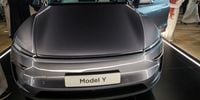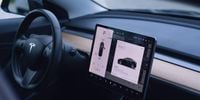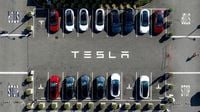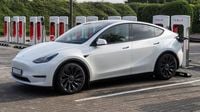Tesla is facing a significant class-action lawsuit in California, with allegations that the company has manipulated the odometers of its electric vehicles to display inflated mileage readings. This practice, according to the lawsuit, not only affects warranty claims but also increases repair costs for consumers, leading to a potential financial windfall for the company.
Filed on April 17, 2025, by a group of Tesla owners, the lawsuit claims that the odometers in Tesla vehicles record more kilometers than actually driven. The lead plaintiff, Nyree Hinton from Los Angeles, asserts that his Tesla Model Y displayed an average of 72 miles (approximately 116 kilometers) per day, despite his actual driving distance being around 20 miles (32 kilometers). This discrepancy, he argues, caused his warranty to expire prematurely, forcing him to pay out of pocket for repair costs that amounted to $10,000 (around 8,800 euros).
According to the lawsuit, Tesla's odometer system does not rely solely on the distance traveled; it also factors in energy consumption, driving behavior, and other elements. This method, the plaintiffs argue, leads to systematic overestimations of mileage, which could affect over a million vehicles if the claims are substantiated. The legal document states, "By linking warranty and leasing mileage limits to inflated odometer readings, Tesla increases its repair revenues, reduces warranty obligations, and forces consumers to buy extended warranties prematurely." This manipulation, if proven, could have dire consequences for the company's reputation and financial standing.
Hinton's experience is not an isolated incident. He discovered that the odometer readings were significantly higher than those of his previous vehicles. During a period when his Tesla was in for repairs, he noted that the odometer continued to record excessive mileage. He stated, "The car showed me 72 miles when I had only traveled 20 miles." Such discrepancies have led to discussions among Tesla owners online, many of whom have reported similar issues with their vehicles. Hinton found numerous customers in internet forums who expressed concerns about inflated mileage displays.
The lawsuit's implications extend beyond just Hinton's case. Legal experts suggest that if the court finds merit in the claims, Tesla could face substantial damages and a loss of consumer trust. The plaintiffs are seeking both compensatory and punitive damages for affected Tesla drivers, which could lead to significant financial repercussions for the automaker.
In response to the lawsuit, Tesla has denied all material allegations. A spokesperson for the company stated that they are committed to transparency and customer satisfaction, although they did not provide further details on the specific claims made in the lawsuit. As of now, Tesla has not issued a public statement regarding the ongoing legal proceedings.
This lawsuit comes at a challenging time for Tesla, as the company has recently faced declining sales figures in several markets, including a reported 15% drop in new registrations in California during the first quarter of 2024. This decline contrasts sharply with a 7.3% growth in zero-emission vehicle registrations overall, indicating that Tesla's market share has been slipping. Analysts attribute this downturn to a lack of new models and the controversial public persona of CEO Elon Musk, further complicating the company's public relations efforts.
As the class-action lawsuit unfolds, it raises critical questions about the reliability of odometer readings in modern vehicles, particularly those that rely on complex algorithms rather than traditional mechanical systems. Consumers are left wondering how much they can trust the technology that underpins their vehicles and whether they have adequate recourse when discrepancies arise.
This case could set a significant precedent not only for Tesla but also for other manufacturers that utilize similar odometer technologies. The outcome may prompt manufacturers to reevaluate their odometer systems and warranty policies to avoid similar legal challenges in the future.
As of now, the legal battle is just beginning, and the ramifications of the lawsuit could resonate throughout the automotive industry. For Tesla drivers like Hinton, the stakes are high, as they navigate the complexities of warranty claims and repair costs while grappling with the potential fallout from this high-profile case.
With over a million vehicles potentially affected, the class-action lawsuit against Tesla is poised to attract attention not only from consumers but also from regulators and industry observers. The outcome could have lasting impacts on consumer trust and the future of electric vehicle sales.










